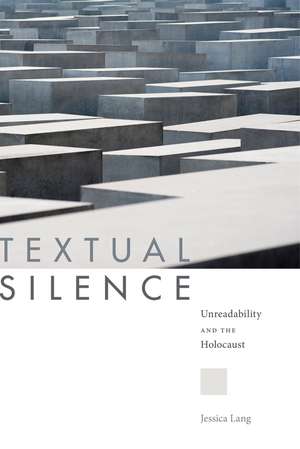Textual Silence: Unreadability and the Holocaust
Autor Jessica Langen Limba Engleză Paperback – 23 aug 2017 – vârsta ani
There are thousands of books that represent the Holocaust, but can, and should, the act of reading these works convey the events of genocide to those who did not experience it? In Textual Silence, literary scholar Jessica Lang asserts that language itself is a barrier between the author and the reader in Holocaust texts—and that this barrier is not a lack of substance, but a defining characteristic of the genre.
Holocaust texts, which encompass works as diverse as memoirs, novels, poems, and diaries, are traditionally characterized by silences the authors place throughout the text, both deliberately and unconsciously. While a reader may have the desire and will to comprehend the Holocaust, the presence of “textual silence” is a force that removes the experience of genocide from the reader’s analysis and imaginative recourse. Lang defines silences as omissions that take many forms, including the use of italics and quotation marks, ellipses and blank pages in poetry, and the presence of unreliable narrators in fiction. While this limits the reader’s ability to read in any conventional sense, these silences are not flaws. They are instead a critical presence that forces readers to acknowledge how words and meaning can diverge in the face of events as unimaginable as those of the Holocaust.
Holocaust texts, which encompass works as diverse as memoirs, novels, poems, and diaries, are traditionally characterized by silences the authors place throughout the text, both deliberately and unconsciously. While a reader may have the desire and will to comprehend the Holocaust, the presence of “textual silence” is a force that removes the experience of genocide from the reader’s analysis and imaginative recourse. Lang defines silences as omissions that take many forms, including the use of italics and quotation marks, ellipses and blank pages in poetry, and the presence of unreliable narrators in fiction. While this limits the reader’s ability to read in any conventional sense, these silences are not flaws. They are instead a critical presence that forces readers to acknowledge how words and meaning can diverge in the face of events as unimaginable as those of the Holocaust.
Preț: 360.14 lei
Nou
Puncte Express: 540
Preț estimativ în valută:
68.92€ • 73.69$ • 57.46£
68.92€ • 73.69$ • 57.46£
Carte indisponibilă temporar
Doresc să fiu notificat când acest titlu va fi disponibil:
Se trimite...
Preluare comenzi: 021 569.72.76
Specificații
ISBN-13: 9780813589916
ISBN-10: 0813589916
Pagini: 232
Ilustrații: 10 photographs
Dimensiuni: 152 x 229 x 13 mm
Greutate: 0.34 kg
Ediția:None
Editura: Rutgers University Press
Colecția Rutgers University Press
ISBN-10: 0813589916
Pagini: 232
Ilustrații: 10 photographs
Dimensiuni: 152 x 229 x 13 mm
Greutate: 0.34 kg
Ediția:None
Editura: Rutgers University Press
Colecția Rutgers University Press
Notă biografică
JESSICA LANG is an associate professor of English at CUNY-Baruch College in New York, where she is the founding Newman Director of the Wasserman Jewish Studies Center.
Cuprins
Introduction 1
1 Readability and Unreadability: A Fractured Dialogue 9
Part I
Generational Differences in Holocaust Literature
2 Before, During, and After: Reading and the Eyewitness 35
3 Reading to Belong: Second-Generation and the Audience of Self 58
4 The Third Generation’s Holocaust: The Story of Time and Place 87
Part II
Pushed to the Edges: The Holocaust in American Fiction
5 American Fiction and the Act of Genocide 119
6 Receding into the Distance: The Holocaust as Background 155
Afterword: Reading the Fragments of Memory 175
Acknowledgments 179
Notes 181
Bibliography 199
Index 209
1 Readability and Unreadability: A Fractured Dialogue 9
Part I
Generational Differences in Holocaust Literature
2 Before, During, and After: Reading and the Eyewitness 35
3 Reading to Belong: Second-Generation and the Audience of Self 58
4 The Third Generation’s Holocaust: The Story of Time and Place 87
Part II
Pushed to the Edges: The Holocaust in American Fiction
5 American Fiction and the Act of Genocide 119
6 Receding into the Distance: The Holocaust as Background 155
Afterword: Reading the Fragments of Memory 175
Acknowledgments 179
Notes 181
Bibliography 199
Index 209
Recenzii
"A valuable and timely resource that speaks to the necessity of ethical reading in regard to Holocaust representation."
"Lang's exquisitely wrought study defines and explores the challenges of reading trauma literature, shedding light on the irony that reading does not equate to understanding."
Descriere
In Textual Silence, literary scholar Jessica Lang asserts that language itself forms barriers between the author and the reader in Holocaust texts—and that these barriers, or silences, are not a lack of substance, but an essential characteristic of the genre.
